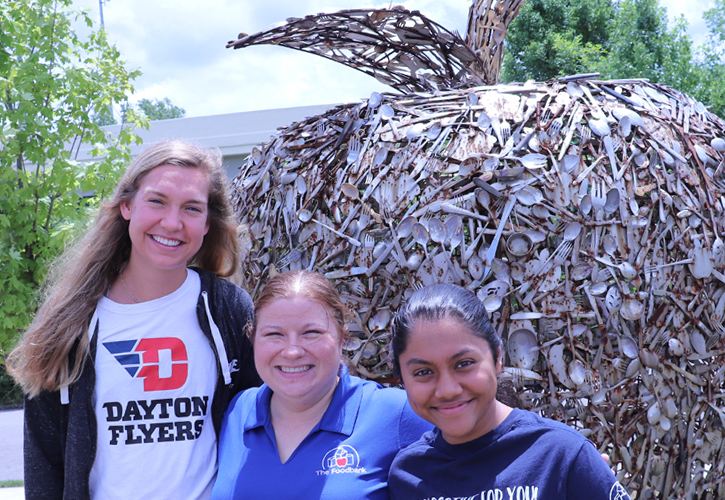College of Arts and Sciences Newsroom

Serving Dayton in Disaster’s Wake
The Memorial Day tornado outbreak that devastated communities across the Dayton region put a number of University of Dayton students at the forefront of local disaster recovery efforts.
Kaci Bornhorst and Aniqa Ahmed were only a few days into their summer internships at the Dayton Foodbank when 21 confirmed tornadoes touched down across Western Ohio on the evening of May 27 and the early morning of May 28. The largest was rated an EF4, carrying winds up to 170 mph. It hit Trotwood, Brookville, Riverside and Dayton, damaging or destroying thousands of structures, and leaving many area residents without food, water, electricity or shelter.
Bornhorst, a senior exercise science and psychology major from Minster, Ohio, spent much of the following week directing traffic outside the Foodbank.
“There were cars wrapped around our building to drop off donations or to pick up items,” she said. “Volunteers also would load up their personal vehicles with water and we would send them out to different locations that were in special need.”
Two months later, the Foodbank’s on-site, drive-through food pantry — normally open to the public once a week — continues to provide tornado relief to 80 to 100 cars per day Mondays through Wednesdays, and 300 to 400 cars on Fridays.
“We definitely can still see the aftermath today,” said Ahmed, a junior political science major from Bethesda, Maryland. She spent weeks entering hand-written client data, which was collected on paper to expedite service to tornado victims, into the Foodbank’s tracking system for reporting to state and federal agencies.
Bornhorst and Ahmed both interned at the Foodbank through the Fitz Center for Leadership in Community’s Semester of Service program.
Students take a sabbatical from classes to work at local social service agencies 35 hours per week for 13 to 15 weeks. They also participate in a weekly, three credit-hour mini-course that focuses on community social justice issues. Typically, five students serve during the fall semester, five serve during the spring and 10 serve during the summer.
Semester of Service provides students with an in-depth, hands-on learning experience that offers professional training, facilitates vocational exploration and empowers them to become lifelong advocates for social change. The program is funded by an endowment and annual grants from the Marianists.
“With the recent tornadoes occurring the first week the students arrived at their placement sites, they were truly immersed into the community, immediately addressing needs,” said Castel Sweet, Fitz Center coordinator for community engaged-learning and scholarship. “Even though it might have been hectic for both the organization and student, I think it was an excellent way for students to learn the ways in which they must be flexible when working in the community.”
During the first week after the tornado, Brittany Resar and the associate pastor at McKinley Methodist Church in Dayton picked up cases of water and set up a distribution station in the church’s basement. Her normal duties at the church’s John Moore Center for Equity included preparing and serving meals for several weekly programs; sorting, folding and arranging clothes for a thrift store; and writing an emergency protocol and 10-week outline for an evening youth program.
“There were many people who came to pick up a case of water and asked for additional cases to take to someone who was impacted,” said Resar, a senior middle childhood education major from Elyria, Ohio. “There also were numerous people who donated food, cleaning supplies and cases of water to be distributed to the victims. I am grateful that I was able to see the best in humanity come out after such a tragic event.”
Immediately after the tornado outbreak, the Foodbank ramped up operations and began working with Montgomery County Emergency Management, the American Red Cross and other organizations to first acquire and distribute water, followed by food and other necessities, said Lora Davenport, advocacy and programs manager. She expects the Foodbank to continue helping with tornado relief for the next several years, albeit at a reduced rate over time.
Davenport said the arrival of the Semester of Service interns was perfect timing.
“They had been here for two days,” she said. “When we first opened our doors, we became a place for volunteers to come and for the public to find a way that they could help without going into the areas where there were power lines down — the place was a mess and it wasn’t safe for them. Having extra hands to wrangle volunteers and send them to different areas was fantastic.”
Bornhorst, a member of the women’s track and field and cross-country teams, typically spent several days each week in Foodbank’s mobile pantry distributing food to communities across three counties. She also managed volunteers at the Foodbank’s warehouse. She said she gained valuable leadership and teamwork skills she can take into her future career, possibly as a clinical psychologist.
As the Foodbank’s advocacy intern, Ahmed contacted elected officials to address Dayton’s food insecurity issue and why the Foodbank needs to be federally funded. She also researched proposed legislation to lower the federal poverty line, which could create greater hardships for many Foodbank clients.
“My dream is to become a lobbyist, so working here is a great experience for me,” Ahmed said. “Being able to communicate with people one-on-one and seeing the need in the community — especially after the tornado, just seeing how it impacted the community — it was very eye-opening.”
- Dave Larsen, communication coordinator, College of Arts and Sciences
Photo above (L to R): Kaci Bornhorst, student; Lora Davenport, Foodbank staff; and Aniqa Ahmed, student.
